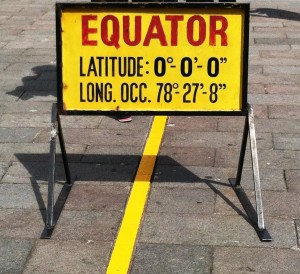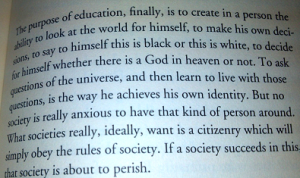Reading Time: 4 minutes“Travel is fatal to prejudice, bigotry, and narrow-mindedness, and many of our people need it sorely on these accounts. Broad, wholesome, charitable views of men and things cannot be acquired by vegetating in one little corner of the earth all one’s lifetime.”
-Mark Twain
I recently went to Ecuador on a “Fellowship and Learning Tour” via The Ecuador Partnership where we were able to learn about some churches and schools that [our] U.S. Mennonite congregations have helped to sustain over a period of 10 years.
The problem with being able to provide (mainly financial) sustenance to these congregations is the sense of dependency that is evident during our visits with each other.
As an American, we are held in high regard, even revered, but it’s not a comfortable feeling.
The Ecuador representative confided in me that because of this dependency, true growth in these congregations is stunted. Autonomy is still a far-off goal.
In our visits with each other, we recognize the great need of the congregations. But, instead of speaking financially with the Ecuadorian congregations, our American leaders simply refer back to the importance of relationships and how this 10-year-long relationship is helping to show whether financially supporting Ecuador will be “worth it” or not. In other words, [we] want to support something that can be self-sufficient and sustainable.
My hands, as an American with a fondness for fellow Latin@s and a passion for helping those who need, remain tied. I tagged along to learn and kept an open mind as to what I would learn, even though I do not carry much weight when it comes to deciding whether/how to support our Ecuadorian partners. The Ecuador Partnership has existed for over 10 years and consists of 3 Mennonite organizations: Central Plains Mennonite Conference, Mennonite Mission Network and the Colombia Mennonite Church. Every other year or so, this partnership tries to set-up travel groups from the U.S. to Ecuador and vice-versa. Anybody affiliated with the Central Plains Mennonite Conference and who is interested in learning and seeing the partnership in action is invited to travel to Ecuador. Members of the two Ecuadorian congregations travel to the U.S. as well.
Living for a few days in the circumstances these Ecuadorians find themselves in makes it impossible not to embrace such lifestyles, because the people unquestionably embrace you. As the trip went on, I reminded myself to refrain from taking too many exploitative photos and keep my potentially harmful observations as an outsider to myself.
On the 12-day tour, I started to understand how polar our lives are – struggling to access daily transportation, living off of about $5-10 per day and raising three growing teenagers on your own like my host mother; living as a Colombian refugee, in fear for the safety of yourself and your family; uncertain about how well the water will run on any given day; but, I still had a return flight scheduled back to America a few days later, where customs are hardly the same.
Being an outsider American is one thing. But, almost immediately, upon being picked up from the Quito Airport, I was aware that being a Latina American outsider may alter how I was seen in comparison to my fellow travelers.
In Ecuador, straddling the line that distinguishes two hemispheres simultaneously took on a new meaning.

I am Latina. But I am still (and probably more so) American, in Latin America.
Our hosts respectfully question why I don’t (really) know Spanish and leave it at that, after I give the response I have been primed to give (it’s hardly the first time I’ve been questioned about this).
I learned Spanish in High School after my father refused to make any real effort to teach me and my sisters, fearing discrimination similar to what he experienced growing up, only speaking the minority language.
But as the trip goes on, they compliment how much of the language I do know and can understand. Still, I wish I could relate more to them. To be in the company of fellow Latin@s is something I generally appreciate because it does not happen all of the time. It also lent a sense of guilt that I wasn’t prepared for. Nothing, not even double-checking the contents of your suitcase and making sure you have your passport can prepare you for that guilt.
When we had to say goodbye to each other, I was tongue-tied. I could not fully articulate how grateful I was for their hospitality, but I hope my hugs translated some of it.
I learned that one of the challenges of being privileged/having power is knowing how to use it for good and how to respectfully involve the less privileged in deciding what will help most. What will lead to the greatest level of autonomy so true fellowship can take place?
I’ve witnessed these lifestyles while trying not to exploit them, now what?
In my very spacious office room to which I arrive via guaranteed transportation; a room complete with heat and the assurance of running water, I will continue pondering this.
 In an effort to learn about ways to make websites more accessible to all, I had a conversation with Jonathan Green, Communications Specialist with the National Implementation Research Network (NIRN) recently. Thank you to Jonathan for taking the time to share his knowledge.
In an effort to learn about ways to make websites more accessible to all, I had a conversation with Jonathan Green, Communications Specialist with the National Implementation Research Network (NIRN) recently. Thank you to Jonathan for taking the time to share his knowledge.


 “Whatever we do to strengthen and elevate the teaching profession, we should bear in mind that reforms that fail to heed the voice of teachers are doomed.”
“Whatever we do to strengthen and elevate the teaching profession, we should bear in mind that reforms that fail to heed the voice of teachers are doomed.”  What seems like a staunchly anti-Mexican, anti-immigrant saturated Arizona agenda has now irrevocably seeped into the state’s education system, risking the success of its many Mexican students.
What seems like a staunchly anti-Mexican, anti-immigrant saturated Arizona agenda has now irrevocably seeped into the state’s education system, risking the success of its many Mexican students.


